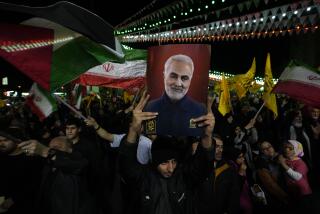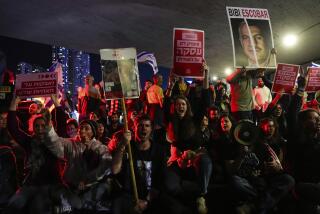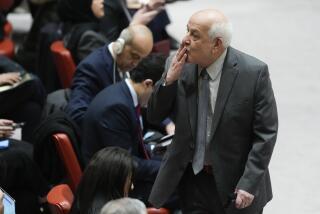Arab League votes to suspend Syria
In a stinging rebuke of President Bashar Assad, the Arab League voted Saturday to suspend Syria if his regime fails to take immediate steps to implement a peace plan designed to end months of unrest in the country.
The suspension would take effect Wednesday, a delay that appears designed to give Syria one more chance to comply with the league-brokered plan approved this month.
The 22-member league, meeting in Cairo, warned that Syria, whose economy is already reeling under the weight of international sanctions imposed because of its crackdown on opposition protests, could face further economic and political penalties from Arab nations.
“Syria is a dear country for all of us, and it pains us to make this decision,” Qatar’s foreign minister, Sheik Hamad bin Jassim al Thani, told reporters after the meeting. “We hope there will be a brave move from Syria to stop the violence and begin a real dialogue toward real reform.”
He suggested that Arab nations withdraw their ambassadors from Damascus, the Syrian capital, a step that some, such as Qatar and Saudi Arabia, have already taken.
The United Nations estimates that 3,500 people have been killed in almost eight months of bloodshed.
The league peace plan mandates that Syria withdraw armed forces from populated areas, release political prisoners and begin a dialogue with opponents, among other steps. The opposition is also required to cease hostilities.
Arab League ministers apparently felt compelled to respond to what many view as Assad’s defiance of their peace blueprint. But the practical effect of a prospective suspension remained to be seen.
Still, the action by a regional Arab group that is often criticized as feckless underscored the gravity of events in Syria and further isolates Damascus diplomatically. The protests and violence have undermined the autocratic rule of Assad and raised the prospect of civil war in the strategically situated nation, which borders Israel, Iraq, Turkey, Lebanon and Jordan.
Syria’s close allies, Iran and the Lebanon-based Hezbollah movement, have issued stern warnings against foreign intervention in Syria.
An Arab League vote helped set the stage for the Western-led bombing campaign in Libya that precipitated the ouster of Moammar Kadafi after more than 40 years in power. Qatar’s Jassim insisted that Saturday’s move was not a prelude to intervention in Syria.
“No one is talking about a no-fly zone; people are trying to mix up the cases,” Jassim told reporters.
But Jassim did not rule out the possibility that the league would call on international organizations, including the United Nations, to protect Syrian civilians.
Syria’s Arab League representative, Yousef Ahmad, denounced the suspension, calling it a “eulogy for Arab common action” and a “blatant announcement” that the league was “subordinate to U.S.-Western agendas,” the official Syrian news agency reported.
Syria maintains that it is complying with the league-brokered peace pact, having released more than 500 prisoners and declared an amnesty for gunmen who surrender and “have no blood on their hands.”
The opposition calls the moves phony and says Damascus has stepped up attacks, especially in the central city of Homs, focal point of the rebellion, where rights activists say scores have been killed in the last two weeks. On Saturday, the opposition reported that at least 18 more people had been killed in political violence, including eight in Homs.
Assad has said his government maintains control but is fighting armed Islamic extremists funded from abroad. Damascus says more than 1,000 security personnel have been killed and that armed “gangs” have engaged in a campaign of ambushes, bombings and assassination.
The Arab League denunciation was a heavy symbolic blow for a nation whose rulers have long considered themselves guardians of Arab nationalism.
Assad was elected president in 2000 after the death of his father, Hafez Assad, who served as Syria’s strongman for 30 years.
Special correspondent Hassan reported from Cairo and Times staff writer McDonnell from Beirut.
More to Read
Start your day right
Sign up for Essential California for news, features and recommendations from the L.A. Times and beyond in your inbox six days a week.
You may occasionally receive promotional content from the Los Angeles Times.






